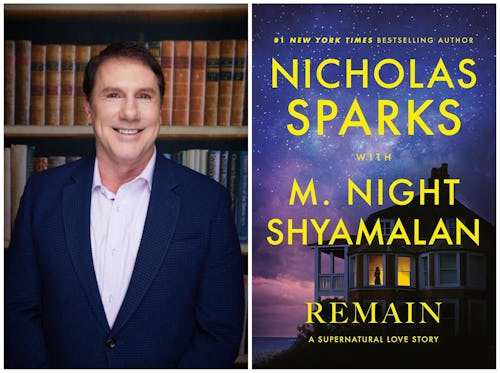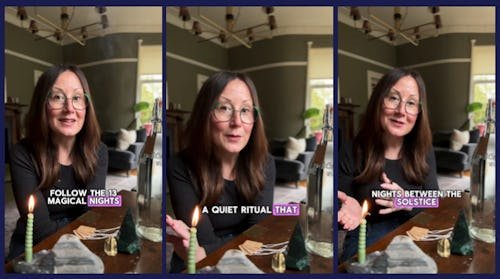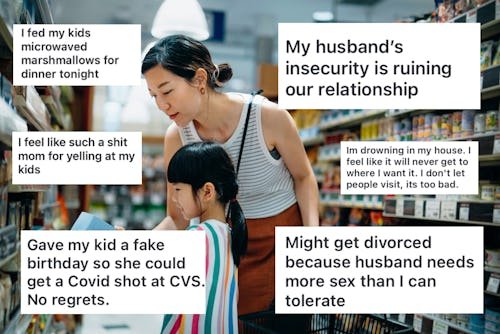

For more than 25 years, Nicholas Sparks has been reminding us that love — in all its messiness and magic — endures. In fact, when you think of him, you probably think of heartrending stories that reduce you to a teary puddle, like The Notebook or Nights in Rodanthe. But the beloved author’s next project takes his signature emotional storytelling into new territory alongside acclaimed filmmaker and master of suspense M. Night Shyamalan. Together, the two have created a supernatural romantic thriller that explores grief, mystery, and whether love can transcend even the boundaries of life and death.
Sparks’ 26th novel, Remain, follows New York architect Tate Donovan, who arrives in Cape Cod to design his best friend’s summer home and start a new chapter after the devastating loss of his sister, Sylvia. Still reeling from her passing (and the supernatural revelation she made from her deathbed), Tate finds himself questioning everything, especially when he forms an intense connection with a beautiful woman named Wren.
The genre-bending collaboration releases Oct. 14, ahead of a 2026 film adaptation starring Jake Gyllenhaal and Phoebe Dynevor, directed by Shyamalan. Sparks caught up with Scary Mommy to discuss keeping his readers surprised after more than two decades of bestsellers, the possibility of The Notebook getting a sequel, and what he hopes he’s remembered for most long after the final chapter closes.
Scary Mommy: This collaboration is such an unexpected but intriguing pairing! What clicked between your storytelling styles?
Nicholas Sparks: There were a couple of things that really clicked … I think there was a certain peer-to-peer respect. We’ve both been around for 30 years. We’re both in good places in our lives. Neither one of us needed this collaboration; neither one of us were trying to do anything. So we approached it from a very healthy, “Hey, this might be interesting and fun. And I wonder if we can.” And so, that was part of it.
There are more similarities between Night’s work and my work than most people probably realize. We both write stories with characters that are explained. They undergo journeys from the beginning of the story to the end of the story. Both Night and I try to tell entertaining stories. But for instance, Remain, yes, it’s a love story, but it’s not very similar to The Notebook. And we have Remain, but well, it’s not very similar to The Sixth Sense.
We both strive for originality within not only our mediums, but in the specific world in which we’ve become successful. Both of us like to surprise by the end and perhaps have the story shift in a way that either viewers or readers didn’t expect.
So, that’s what both of us brought to the table. We shared all that in common, so the collaboration in our mind probably made more sense than it first appears when you see those two names on the cover.
SM: You and Night are creating two versions of the same story — a novel and a film. Are there differences between the two, or do you see them as companion pieces that reveal different layers?
NS: They have a lot of similarities, right? Same general movement, same main characters, same secondary characters, same essential theme. And that’s probably the most important. The theme of the story is the power of love, you might say. So all of that is very similar, but film and novels are very different mediums. Some things work really well in film that don’t work in a novel, and vice versa.
In a novel, for instance, I can hop into the heads of every character, if I wish, and you can’t do that necessarily in a film. Conversely, scenes with great intensity of emotion, Night can do more with two characters looking at each other than I can do in five pages. So, different mediums. And it’s important to understand that just because of the medium, some things work better than others. Some things inherent to one medium don’t work at all.
Night and I, we’ve been around long enough that we understand these changes. The best way to look at this is like you have an identical twin raised by two different people. Or you have one coin, and I fully stamped one side without interference. And he fully stamped the other side without my interference. But it’s still the same coin, right? It’s the coin we created, and that’s it; it’s just the way it works.
SM: This is your 26th novel. How do you keep finding new emotional ground to explore while still surprising even your longtime readers?
NS: Yeah, therein comes the magic of creativity, and some of that I can understand and some of it I don’t. I look upon the works that I’ve done in the past, say, “What haven’t I done?” You might start with that. “Well, what ages haven’t I written about recently?” And that might lead you to other questions. And eventually, you get to a point where you have 20 or 30 questions or elements decided. You might know the beginning or the end; you might know four or five plot elements. You might know a bit about the major characters and some of the secondary characters.
The key is you want all of those things to fit together perfectly for whatever you’re going to write — and lots of stories fall apart when you’ve got six points or eight of those things or 10 of those things. But let’s say you need 20 to write a novel. My motto is always, well, the first clump of 20 wins. That’s going to be my next novel. And I’ve done that ever since Message in a Bottle, basically my second novel.
SM: Oof, Message in a Bottle… that one gets ya right in the heart. But we also have to talk about The Notebook, because I’m a Charleston girl! How does it feel to see one of your earliest works living on in yet another form?
NS: Beautiful. Ingrid Michaelson wrote the music, and Bekah Brunstetter did the book, and I thought they did an amazing job. I’ve seen it half a dozen times. And of course, it’s on tour now. It’s fabulous, getting rave reviews. So, I’m thrilled that people get to see this story, in again, a different medium.
You can do things with music and song that won’t necessarily work in a novel or film. And on stage, you have a beautiful ability to blend time to make it non-linear. When someone is singing, for instance, about the past, and then the younger version of that character appears. It’s magical to see the way the same story has identical triplets, but now they were all raised in entirely different ways. It’s really fun to see.
SM: I’ve noticed that fans sometimes ask for a follow-up. I know The Wedding was a spiritual successor, but would you ever consider doing a true successor?
NS: Yeah, of course. I mean, we’ve been approached for a TV series or a limited series. The Wedding was a bit of a follow-up, not necessarily a part two continuation, but it was a follow-up. So, I’ve dabbled with it, and I just haven’t done anything with it yet. Part of that is how involved do I want to be in whatever version they want to do? Do I actually want to write a second story, for instance, when they’re still young, and you have these two, and life has intervened? What happens then? We’ll see.
SM: OK! So many of your stories deal with love that endures through generations or loss. As a parent, do you feel like watching your own kids grow and change has influenced the way you write about love now, compared to when you were younger?
NS: I was 27 years old when I wrote about 80-year-old Noah Calhoun, so I can’t say that. It’s been a lot of fun watching my kids grow up and fall in love. I have a couple of them married now, another one engaged. And that’s always a delight, to watch them move forward in their lives.
I don’t think it’s changed my writing.
I’ve been kind of set in the idea that emotion, including love, changes a lot more slowly than the rest of the world. In other words, anger a hundred years ago pretty much feels like anger now, or love a hundred years ago feels like love now.
Granted, the world has changed. Now, people drive cars everywhere, and there are cell phones, and we’ve been to the moon, and all of this technology. We walk around with computers basically in purses or in pockets. So the world has changed, but anger, lust, fear, frustration, confusion, love, infatuation — those things are very slow to change.
I’ve kind of always had that view. And whether or not one has children doesn’t really affect that particular view. You might have a different view of, let’s say, parental love or what you’d be willing to sacrifice for your child. You might have a better sense of that, but that’s about it. When I write about emotion, I take the long view.
SM: Beyond the books, what do you hope your children remember you most for?
NS: I’d like to be remembered for the conviction of my faith. I’d like to be remembered for being a good father, for being a good friend, for honesty, willingness to help, those kinds of things. All the things that really matter in life. That’s how I’d like to be remembered.
This interview has been lightly edited for length and clarity.






